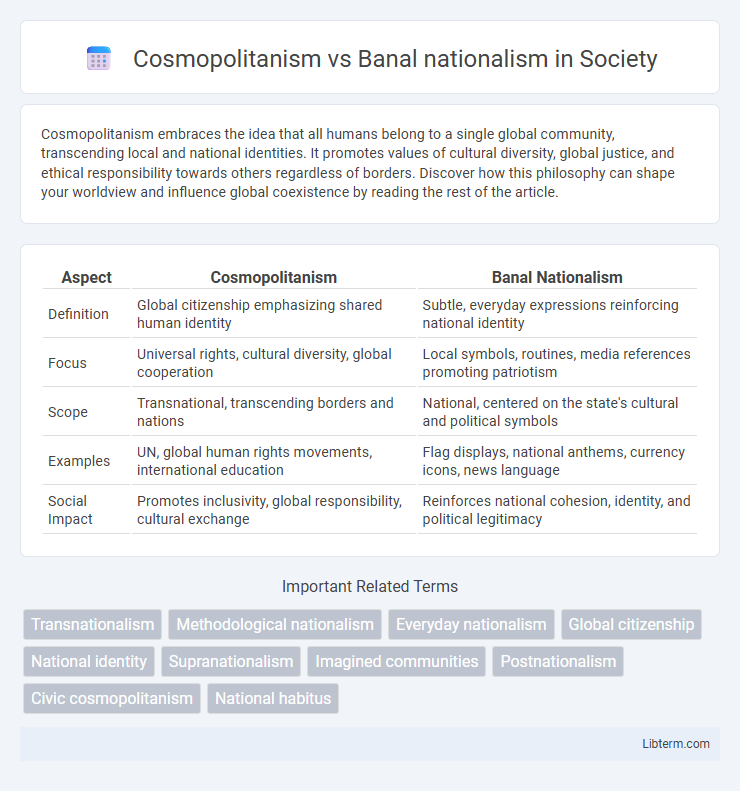Cosmopolitanism embraces the idea that all humans belong to a single global community, transcending local and national identities. It promotes values of cultural diversity, global justice, and ethical responsibility towards others regardless of borders. Discover how this philosophy can shape your worldview and influence global coexistence by reading the rest of the article.
Table of Comparison
| Aspect | Cosmopolitanism | Banal Nationalism |
|---|---|---|
| Definition | Global citizenship emphasizing shared human identity | Subtle, everyday expressions reinforcing national identity |
| Focus | Universal rights, cultural diversity, global cooperation | Local symbols, routines, media references promoting patriotism |
| Scope | Transnational, transcending borders and nations | National, centered on the state's cultural and political symbols |
| Examples | UN, global human rights movements, international education | Flag displays, national anthems, currency icons, news language |
| Social Impact | Promotes inclusivity, global responsibility, cultural exchange | Reinforces national cohesion, identity, and political legitimacy |
Defining Cosmopolitanism
Cosmopolitanism emphasizes global citizenship and the interconnectedness of all human beings beyond national borders, advocating for values such as inclusivity, diversity, and universal moral obligations. It contrasts with banal nationalism, which refers to everyday expressions of national identity embedded in routine practices and symbols that reinforce a sense of belonging to the nation-state. Defining cosmopolitanism involves recognizing its commitment to transcending parochialism by promoting empathy, cultural exchange, and cooperation on a planetary scale.
Understanding Banal Nationalism
Banal nationalism refers to the everyday representations and practices that reinforce a nation's presence and significance in the minds of its citizens without overt patriotism. It operates through routine symbols such as flags, national currencies, and language that subtly promote national identity, contrasting with cosmopolitanism's emphasis on global citizenship and cross-cultural understanding. Understanding banal nationalism reveals how ordinary activities and cultural markers sustain national cohesion and influence social and political behaviors within a society.
Historical Origins and Development
Cosmopolitanism emerged during the Enlightenment as a philosophical ideal promoting global citizenship and the inherent equality of all human beings, rooted in the works of Immanuel Kant and the concept of a universal moral community. Banal nationalism, a term coined by Michael Billig in 1995, describes the everyday, often unnoticed representations and practices that reinforce national identity, developing alongside modern nation-states and mass media in the 20th century. While cosmopolitanism appeals to transnational solidarity and global governance, banal nationalism reflects the persistent, subtle reinforcement of national belonging embedded in daily cultural expressions and institutional rituals.
Core Principles and Values
Cosmopolitanism emphasizes global citizenship, cultural diversity, and universal human rights, advocating for individuals to identify beyond national borders and promote inclusive, ethical responsibilities worldwide. Banal nationalism operates through everyday symbols and routines, fostering a subtle, continuous sense of national belonging and loyalty by reinforcing shared heritage, language, and national narratives within the public sphere. The core values of cosmopolitanism revolve around global justice and intercultural dialogue, whereas banal nationalism centers on implicit national pride and the normalization of state authority in everyday life.
Everyday Practices and Expressions
Everyday practices of cosmopolitanism often involve engaging with diverse cultures through multilingual communication, international cuisine, and global media consumption, reflecting inclusive worldviews. In contrast, banal nationalism emerges in mundane expressions such as flag displays, national anthems at sports events, and habitual use of national symbols that reinforce subtle but continuous national identity. These contrasting behaviors illustrate how individuals negotiate belonging and identity within both global and local contexts through routine actions and cultural habits.
Political and Social Implications
Cosmopolitanism promotes global citizenship and cross-cultural understanding, challenging the traditional nation-state boundaries by advocating for inclusive policies and universal human rights. Banal nationalism, by reinforcing everyday symbols and rituals of national identity, strengthens social cohesion and political loyalty but can limit openness to multiculturalism and international cooperation. The tension between these concepts shapes debates on migration, integration, and global governance, influencing policy decisions and social dynamics within diverse societies.
Cosmopolitanism in a Globalized World
Cosmopolitanism in a globalized world emphasizes individuals' identification with a larger human community beyond national borders, promoting inclusivity, cultural exchange, and global justice. It challenges banal nationalism's everyday, often unnoticed promotion of national belonging and loyalty by fostering awareness of global interconnectedness and diverse identities. This framework supports policies aimed at international cooperation, human rights protection, and collective responsibility for global issues such as climate change and migration.
Banal Nationalism in Media and Culture
Banal nationalism manifests in media and culture through subtle symbols such as flags, national anthems, and everyday language that reinforce national identity without overt political messaging. News outlets often frame stories in a national context, emphasizing shared values and common threats, which normalizes the perception of the nation as the natural social and political unit. Popular culture, including films, sports broadcasts, and advertisements, frequently embed national pride and unity, subtly perpetuating national loyalty and collective belonging.
Points of Tension and Controversy
Cosmopolitanism emphasizes global citizenship and universal values, challenging banal nationalism's focus on everyday nationalism reinforced through routine symbols and practices. Points of tension arise as cosmopolitan ideals often conflict with banal nationalism's subtle promotion of national identity, leading to debates over loyalty, cultural preservation, and political legitimacy. Controversies highlight the struggle between embracing diversity and global interconnectedness versus maintaining cohesive national narratives and sovereignty.
Towards Reconciliation or Coexistence
Cosmopolitanism promotes global citizenship and intercultural dialogue, emphasizing shared human values that foster reconciliation across national boundaries. Banal nationalism, by contrast, reinforces everyday symbols and rituals that sustain national identity, potentially impeding cross-cultural coexistence. Striking a balance involves acknowledging embedded national practices while cultivating cosmopolitan ethics to achieve peaceful coexistence and mutual respect in diverse societies.
Cosmopolitanism Infographic

 libterm.com
libterm.com